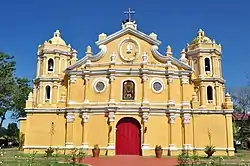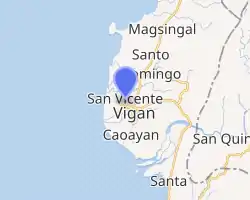San Vicente, Ilocos Sur
San Vicente, officially the Municipality of San Vicente (Ilocano: Ili ti San Vicente; Filipino: Bayan ng San Vicente), is a 5th class municipality in the province of Ilocos Sur, Philippines. According to the 2015 census, it has a population of 12,758 people. [3]
San Vicente | |
|---|---|
| Municipality of San Vicente | |
 San Vicente Ferrer Parish Church in San Vicente, Ilocos Sur | |
 Seal | |
 Map of Ilocos Sur with San Vicente highlighted | |
OpenStreetMap 
| |
.svg.png.webp) San Vicente Location within the Philippines | |
| Coordinates: 17°35′30″N 120°22′30″E | |
| Country | Philippines |
| Region | Ilocos Region (Region I) |
| Province | Ilocos Sur |
| District | 1st District |
| Named for | St. Vincent Ferrer |
| Barangays | 7 (see Barangays) |
| Government | |
| • Type | Sangguniang Bayan |
| • Mayor | Jose C. Tabanda III |
| • Vice Mayor | Maria Nancy D. Tabanda |
| • Representative | Deogracias Victor B. Savellano |
| • Electorate | 7,919 voters (2019) |
| Area | |
| • Total | 12.60 km2 (4.86 sq mi) |
| Elevation | 7.0 m (23.0 ft) |
| Population | |
| • Total | 12,758 |
| • Density | 1,000/km2 (2,600/sq mi) |
| • Households | 2,761 |
| Economy | |
| • Income class | 5th municipal income class |
| • Poverty incidence | 9.55% (2015)[4] |
| • Revenue | ₱82,078,881.09 (2016) |
| Time zone | UTC+8 (PST) |
| ZIP code | 2726 |
| PSGC | |
| IDD : area code | +63 (0)77 |
| Climate type | tropical monsoon climate |
| Native languages | Ilocano Tagalog |
The municipality is known for its production of beautiful furniture made from narra and other tropical hardwoods, even from old wood previously used in wooden sugarcane crushers and old houses to make reproduction antiques.
Etymology
The municipality's name came from the name of Saint Vincent Ferrer, whose winged statue was found inside a box entangled in fishing nets. The fishermen consulted this matter to the friars in Villa Fernandina (now Vigan), who identified the person depicted by the statue. The statue was carried to the town's center, where a church was built. From then on, the town formerly known as Tuanong (sometimes called Taonan) became San Vicente.
History
In tracing the history of San Vicente, one always has to start from Vigan. Vigan was established by the Spanish colonizer, Juan de Salcedo on June 13, 1573 up to 1582, there were only 800 residents.
Upon Salcedo’s return in 1574, he brought with them the Augustinian friars in order to teach Christianity to the inhabitants. After Salcedo’s death on March 11, 1576, Franciscan friars replaced the Augustinians in the year 1579. These same friars spread up to San Vicente to convert the people to the Catholic faith.
In 1591, Vigan has already an organized form of government, which included these barrios namely: Bo. Tuanong, Bo. Santa Catalina de Baba and Bo. Caoayan. There were then a population numbering about 4,000 inhabitants.
Between the years 1720 and 1737, the first chapel of Bo. Tuanong was erected. Later in 1748, the Confraternity of Jesus of Nazareth was organized. In one record of the Vigan Convent archives, a funeral that happened on January 29, 1748 at the Chapel Bo. Tuanong was recorded. Two chaplains Bro. Don Agustin de la Encarnacion and Don Pedro Geronimo de Barba were the priest stone the chapel in that year 1748. It is believed that the chapel is the first stone building that sees upon entering the San Vicente Central School from the main road. Bo. Tuanong which belonged to Vigan was the old name of San Vicente.
On June 16, 1751, the chaplain was Don Miguel de Montanez. He was the first priest there and also in the chapel of San Sebastian. It is found out that Barangay San Sebastian already erected.
Hardship in reaching Bo. Tuanong and Bo. Santa Catalina de Baba from Vigan especially during the months of June to October was experienced, due to the absence of dike or bridge. Priests from Vigan reached these places by means of a raft. The problem prompted the separation of these two barrios from Vigan in 1793.
In 1795, it was the initiation of the seat of municipality and the church and Bo. Tuanong became San Vicente de Ferrer. Don Pedro de Leon was the first parish priest and he was believed as the initiator of the construction of the Church of San Vicente.
Geography
Barangays
San Vicente is politically subdivided into 7 barangays. [2]
- Bantaoay
- Bayubay Norte
- Bayubay Sur
- Lubong
- Poblacion
- Pudoc
- San Sebastian
Climate
| Climate data for San Vicente, Ilocos Sur | |||||||||||||
|---|---|---|---|---|---|---|---|---|---|---|---|---|---|
| Month | Jan | Feb | Mar | Apr | May | Jun | Jul | Aug | Sep | Oct | Nov | Dec | Year |
| Average high °C (°F) | 30 (86) |
31 (88) |
33 (91) |
34 (93) |
33 (91) |
31 (88) |
30 (86) |
30 (86) |
30 (86) |
31 (88) |
30 (86) |
29 (84) |
31 (88) |
| Average low °C (°F) | 19 (66) |
19 (66) |
21 (70) |
23 (73) |
25 (77) |
25 (77) |
24 (75) |
24 (75) |
24 (75) |
22 (72) |
21 (70) |
19 (66) |
22 (72) |
| Average precipitation mm (inches) | 9 (0.4) |
11 (0.4) |
13 (0.5) |
23 (0.9) |
92 (3.6) |
122 (4.8) |
153 (6.0) |
137 (5.4) |
139 (5.5) |
141 (5.6) |
42 (1.7) |
14 (0.6) |
896 (35.4) |
| Average rainy days | 4.6 | 4.0 | 6.2 | 9.1 | 19.5 | 23.2 | 24.0 | 22.5 | 21.5 | 15.2 | 10.5 | 6.0 | 166.3 |
| Source: Meteoblue (modeled/calculated data, not measured locally) [5] | |||||||||||||
Demographics
|
| ||||||||||||||||||||||||||||||||||||||||||||||||
| Source: Philippine Statistics Authority [3] [6] [7][8] | |||||||||||||||||||||||||||||||||||||||||||||||||
In the 2015 census, the population of San Vicente, Ilocos Sur, was 12,758 people, [3] with a density of 1,000 inhabitants per square kilometre or 2,600 inhabitants per square mile.
References
- Municipality of San Vicente | (DILG)
- "Province: Ilocos Sur". PSGC Interactive. Quezon City, Philippines: Philippine Statistics Authority. Retrieved 12 November 2016.
- Census of Population (2015). "Region I (Ilocos Region)". Total Population by Province, City, Municipality and Barangay. PSA. Retrieved 20 June 2016.
- "PSA releases the 2015 Municipal and City Level Poverty Estimates". Quezon City, Philippines. Retrieved 1 January 2020.
- "San Vicente: Average Temperatures and Rainfall". Meteoblue. Retrieved 14 May 2020.
- Census of Population and Housing (2010). "Region I (Ilocos Region)". Total Population by Province, City, Municipality and Barangay. NSO. Retrieved 29 June 2016.
- Censuses of Population (1903–2007). "Region I (Ilocos Region)". Table 1. Population Enumerated in Various Censuses by Province/Highly Urbanized City: 1903 to 2007. NSO.
- "Province of Ilocos Sur". Municipality Population Data. Local Water Utilities Administration Research Division. Retrieved 17 December 2016.